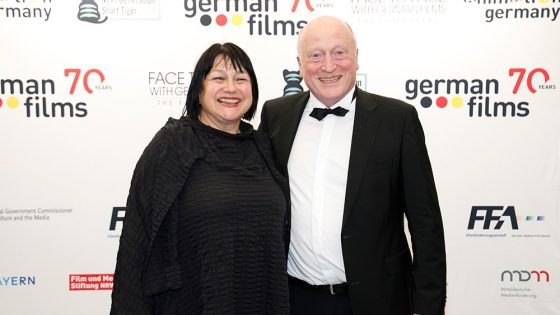German Films celebrated its 70th anniversary at Cannes on Sunday, with its guests looking back but also looking forward.
“It has gotten much better,” Managing Director Simone Baumann told Variety at the event.
“We’ve had Oscar-winning ‘All Quiet on the Western Front,’ Oscar-nominated ‘The Teachers’ Lounge’ [for best international feature], films by Wim Wenders and with Sandra Hüller! Sure, Wim showed a Japanese movie and Sandra a French one [‘Perfect Days’ and ‘Anatomy of a Fall’], but it doesn’t matter: It’s more ‘mixed’ these days and I am proud of it, to be honest.”
At Cannes, 11 German productions and co-productions have been selected this year, including Match Factory’s main competition offerings “Motel Destino” by Karim Aïnouz – who also attended the bash – and Miguel Gomes’ “Grand Tour.” Run Way Pictures is behind Mohammad Rasoulof’s anticipated “The Seed of the Sacred Fig.”
As festivals get “more competitive,” underlines Baumann, international collabs are here to stay. As well as films that aren’t afraid of tackling contemporary events, observed “The Teachers’ Lounge” producer Ingo Fliess.
“We wanted to take a look at our society as it is. To make a film that’s completely in the present, not in the past. The world is curious about Germany, but also about the Germany of today,” he said.
Which, at least at the beginning, wasn’t an easy sell.
“The funny thing, or the sad thing, is that nobody wanted it. We were told it has ‘no international potential.’ And then the whole world looked at it, saying: ‘Wait a minute. It’s about us, too.”
Praising German Films – “They supported our Oscar campaign and we couldn’t have done it without them” – Fliess also called out for change.
“We need a new law of film funding in Germany, because now we are the idiots of Europe. We don’t have a system that’s competitive. Also, we have to be even more daring. We see what Lanthimos does, Carax, Audiard. Cinema, to my mind, is about excess and avant garde.”
Actor Sunnyi Melles, back in town after German comedy drama “The Zweiflers” was named Best Series at Canneseries in April, agreed:
“We should not be afraid of failing and of trying new things. Like Kubrick, like Tarantino. When you leave your comfort zone, you grow. You go into the unexpected. For me, a film’s nationality ultimately doesn’t matter – I just want to discover the thoughts of someone who’s writing and directing, and I feel grateful when these collaborators are different.”
While intense dramas continue to dominate the festival circuit, there should be space for other emotions as well.
“Chaplin said: ‘Anyone can make them cry, but it takes a genius to make them laugh.’ This way, you make their day. It happened to me with ‘Triangle of Sadness,’ during that puking scene. It’s O.K. to cry, but we also have to make people laugh,” she noted.
European Shooting Star for Germany and actress Katharina Stark – soon to be seen in Agnieszka Holland’s “Franz” about Franz Kafka – also made a case for tales with “positive impact.”
“I like stories where people are empowered. That’s what I am looking for now,” she said, also reflecting on new possibilities opening up for local actors following Hüller’s international success. At Cannes, Diane Kruger will appear in David Cronenberg’s “The Shrouds” and Franz Rogowski was seen in Andrea Arnold’s “Bird.”
“That’s a great development: there are many people living in other countries who have accents, so it should be normalized in films and series as well. We don’t all sound the same,” said Stark.
Despite their pedigree, German films can be under-appreciated, said Edvinas Pukšta, curator of Baltics Competition program at POFF.
“At festivals other than Berlinale, they are still something to be discovered. Thanks to German Films, we always get so many films to watch: more than we need! We have a chance to see everything. Not every organization is that precise.”
Bohdan Zhuk, director of Ukraine’s first LGBTQ+ festival Sunny Bunny, added: “German Films often support our activities – they have been supporting the Ukrainian Pavilion at Cannes, too. Ours is a new event and it shows they are eager to promote German films everywhere, not just at the biggest festivals.”
Now, thanks to a new anniversary initiative, they are also introducing younger viewers to some time-proven gems.
“We are offering festivals and film weeks a package of some of the most successful German films of the last 70 years,” explained Baumann. Curated by Alfred Holighaus, “70 Years of German Cinema – A Success Story” includes the likes of “Yesterday Girl” by Alexander Kluge, “Wings of Desire” or “Good Bye, Lenin!,” as well as documentaries and shorts.
“At first, I thought only a handful of people would be interested and then I couldn’t believe my eyes. In Rome, we showed ‘Run Lola Run’ [from 1998]. The cinema was full!”

Source Agencies


